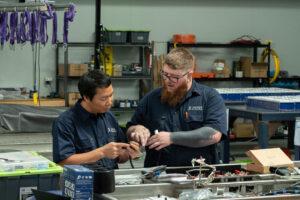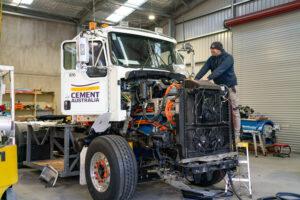“Celebrating Resilience and Innovation Among Regional Start-Ups.”
Hunter Manufacturing Awards proudly recognises outstanding start-ups. Despite encountering challenges, many Hunter entrepreneurs survive and thrive. Some pivot and many scale. Their ingenuity and initiatives only enhance the region’s manufacturing ecosystem.
Lex Forsyth, CEO and Co-founder of Janus Electric, relocated from Brisbane to Berkeley
Vale on the Central Coast to launch his business. The HMA outstanding start-up for 2023
aims to electrify Australia’s road transport fleet.
With the push for electric vehicles on the rise, Mr Forsyth acknowledged the pressure on
the trucking industry to reduce its carbon footprint. The Janus Electric team developed an
electric truck conversion kit with a revolutionary exchangeable battery that takes just four
minutes to swap over.
Jared Lawlor and Claire Jones co-founded smart gardening company Herb Urban six years
ago in inner-Newcastle Islington. Mr Lawlor is an electrical engineer and Ms Jones a
communications strategist. Herb Urban’s core business is to help people more easily grow
their own vegetables.
Since commencing operations, Mr Lawlor and Ms Jones used the technology underpinning Herb Urban to start another business, Cloud Grow, which delivers those technology solutions to other companies for green infrastructure products.
Janus Electric acknowledges the opportunities the Hunter and Central Coast offer, and is
keen to retain, upskill, and attract workers and people.
“There are high school students and young men and women who don’t need to go to
university,” Mr Forsyth says. “We have to look at TAFE and skills courses and how we attract the younger generation. Particularly those who want to stay in the area.”
When Janus Electric commenced as a Central Coast start-up, it had a good base team,
which has expanded over the past four years. Mr Forsyth estimates he will need to hire
between 200 and 300 employees for his manufacturing plant over the next five years and
he’s keen to tap into the Hunter’s networks of people.
“They are here,” he says. “Everything you need is here. It’s just knowing where to go, who
to work with, and how to work with them. That’s been one of the challenges as a start-up.”
Herb Urban’s experience is similar, but for expertise as opposed to a workforce. The
company was an HMA 2023 start-up finalist.
“We set a high standard,” Mr Lawlor says. “We landed on Hydro Laser Cut in Cardiff as a quality provider. It is great that those skill sets are here in the Hunter.”
Herb Urban has developed a technology to connect people to their food sources and make
it simple to grow all manner of plants – anything from herbs and veggies to ornamentals.
“Growing your own food can be a hurdle for many people, be it lack of space, skills, time,
or knowledge,” Ms Jones says. “Herb Urban systems understand these pain points and
work in just the right amount of technology to make growing your own food easy, but not
enough that it feels like you have no involvement at all.”
To optimise space, Herb Urban mounts “smart gardens” to walls. It sells three physical
products for DIY veggie growers to “grow up” – the Food Wall, the Green Beam, and the
Balcony. But at its core it is a technology business.
“We design all of the electronics,” Mr Lawlor says. “We do all the software development, and we do much of the manufacturing in-house. We also support local manufacturers. Hydro Laser Cut at Cardiff does a lot of our fabrication work. We use local industrial designers and local software developers and try to keep everything in Newcastle, in the Newcastle ecosystem where possible.”
It has also opened up its premises to other creatives with “Newcastle’s greenest co-working
space”, the Herb Urban Hub. The “beautiful” co-working hub is a product of Herb Urban’s
constant pivoting.
“Our site is a 340 square metre converted warehouse,” Mr Lawlor says. “But Herb Urban
itself runs a very lean production stream using only about 170 square metres. The hub
provides studios, probably 25% as desk space, and the rest is creative spaces. We have
photographers, ceramicists, artists, and architects in here. They occupy a bit more space.
It’s all about diversifying a little bit.”
It’s another pointer to the significant role start-ups can play in the manufacturing ecosystem.
Janus Electric also appreciates the benefits of initiative.
“If we don’t support start-ups, we are never going to develop anything new,” Mr Forsyth says. “They are nimble, which allows them to develop. They’re not running through a bureaucracy of multiple levels of management, which is where you lose true innovation.”
But many start-ups often need a base injection of capital to support them to grow into
something that can scale. It allows them to be a fledgling business by themselves once they
are operational.
Mr Forsyth believes the government approach should be to create meaningful investment
in areas that ensures meaningful impact on our communities. He says instead of handing
out grants, it would be better to offer low-interest loans to start-ups. And he has no
problem with criteria that sets requirements.
“The lender can take an equity position,” he says. “If the start-up can’t pay back its loan,
then it forfeits control.”
Janus Company Secretary Renae Lulham says start-ups also create adaptability.
“Everybody in our team is multifaceted and multiskilled, which makes us agile and mobile,”
she says. “They may have started in one particular role but because of the demands that are
involved with the start-up they build an amazing wealth of knowledge that becomes the
company. It’s incredible.”
Mr Forsyth says when he moved from Brisbane, he was unaware of the beauty of the Central Coast, especially its beaches.
“You always have to consider the quality of life for your people and the cost of living,” he
says.
Start-ups can help create an identity. Mr Forsyth points out the cities around the world
known for their major manufacturer and the associated pride of the people. Seattle, for
example, is synonymous with Boeing and its massive facility and assembly plant.
“There’s a real opportunity in the Hunter region to be known for some of these really major
market brands,” he says. “You look at the guys at Varley with the fire trucks and emergency
services vehicles. Now that’s a proud, long-term generational business that has been in the
Hunter region building products and value adding.
“Newcastle was known for BHP. It used to be a BHP steel town. It’s now time to put the
Hunter on the map with something other than coalmines.”
High-tech manufacturing is one possibility. When it started, Herb Urban didn’t have any
intention of spinning anything out of its operations. But it took advantage of small-business
adaptability.
Apart from electrical engineering, Mr Lawlor can also design and develop printed circuit
boards. It’s handy, because green infrastructure is a huge growing segment across the
globe as people look to make cities more liveable.
“You have to think on your feet and see the opportunities,” he says. “Our goal with Cloud Grow is to ensure we are the technology backbone of all these green infrastructure projects – making them more robust and reliable to ensure their uptake continues to increase in faster numbers. And there’s not as much cost associated with the projects.”
Ms Jones says in its six years, Herb Urban has expanded beyond the initial idea of helping
people grow food in their homes to ornamental themes and into the corporate market.
Herb Urban offers office fitouts with its “great green wall infrastructure”.
“We find government, corporate, and commercial clients are opting for beautification
projects,” she says. “We’ve done dozens of gardens for Newcastle City Council’s
beautification program, and we have recently started looking at state government
opportunities as well.”
In particular, Herb Urban seeks state government funding. It believes the technology
component underpinning the business makes it an attractive option.
“We know local and state government have biodiversity targets and they are looking to
solve heat-island effects,” Mr Lawlor says. “They are also looking at carbon sequestration
and they are looking to green infrastructure projects to help with that.
“That’s why we started Cloud Grow. Rather than Herb Urban having technology in and of its own products, Cloud Grow will deliver those technology solutions to government and other companies’ green infrastructure products. We had acquisition interest for Herb Urban last year, but we didn’t sell. We saw value in the technology that we could add.”
Ms Jones says the future for Cloud Grow is endless.
“We provide something that is needed across the globe,” she says. “So, we love to be at
the forefront of technology in green infrastructure. Herb Urban will continue to make it
easier for people to grow their own herbs and vegetables locally. And we’re looking at
making our products, notably the Herb Urban balcony, easier to manufacture and ship
around.”
With cost-of-living pressures and the focus on all things “green”, Herb Urban seems to be
in the right place at the right time.
So too Janus Electric.
“There are few places in Australia outside of capital cities that you could go to and have the
diversity of manufacturing support and the variety of services like the Hunter,” Mr Forsyth
says. “It’s unique. But the region must recognise what’s here, and what else can draw
people to relocate and bolster manufacturing.”
HMA’s mission is to promote best practices and it has recognised manufacturing in the Hunter, Central Coast, and Mid-North Coast for 20 years. It collaborates with key regional organisations toacknowledge excellence in innovation, product design, technology, emerging talent, building workforce capability, sustainable operations, and collaboration.
In highlighting the achievements of the best, HMA aims to inspire aspiration. It encourages all manufacturers in the Upper Hunter, Lower Hunter, Central Coast, Lake Macquarie, Newcastle, Port Stephens, and Mid-North Coast regions to enter the 2024 awards. There are 14 categories available.
For all enquiries about the 2024 awards, please email info@hma.org.au or phone 0438 242 899. The registration and nomination period closes on 30 August. Entry is free and manufacturers can find all the information they need at www.hma.org.au




